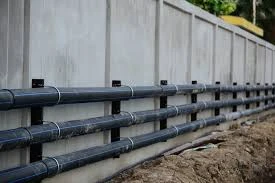کانونی یەکەم . 21, 2024 13:41 Back to list
hdpe duct pipe
Understanding HDPE Duct Pipe
High-Density Polyethylene (HDPE) duct pipe is a widely utilized material in various applications, particularly in telecommunications, electrical, and water management systems. Characterized by its robustness and resilience, HDPE duct pipe has emerged as a preferred choice for many engineers and contractors due to its unique properties and benefits.
What is HDPE?
High-Density Polyethylene (HDPE) is a thermoplastic polymer made from petroleum. It is known for its high strength-to-density ratio, making it suitable for a variety of applications, including packaging, containers, and construction materials. Its chemical structure consists of long chains of ethylene molecules that provide toughness and high resistance to impacts and stress.
Properties of HDPE Duct Pipe
HDPE duct pipes are engineered to offer several advantageous features
1. Durability HDPE duct pipes are highly resistant to stress cracking, impact, and environmental conditions. This durability ensures a long lifespan, reducing the necessity for frequent replacements.
2. Corrosion Resistance Unlike metal pipes that may corrode over time, HDPE is resistant to a wide range of chemicals, making it an excellent choice for transporting various fluids and gases.
3. Lightweight and Easy to Handle HDPE duct pipes are significantly lighter than metal pipes, making them easy to transport and install. This translates to lower labor costs and faster project completion.
4. Flexible and Versatile The flexibility of HDPE allows it to bend under pressure without breaking, making it suitable for various installation environments, including those with challenging terrain.
5. Low Friction Coefficient The smooth inner surface of HDPE duct pipes allows for reduced friction, promoting optimal flow rates, which is particularly critical in plumbing and electrical conduits.
Applications of HDPE Duct Pipe
hdpe duct pipe

HDPE duct pipes find applications in numerous fields, including
1. Telecommunications These pipes are widely used for protecting fiber optic cables and other telecommunication lines. Their durability and lightweight nature make them ideal for underground installations.
2. Electrical Conduits In electrical applications, HDPE duct pipes serve as conduits to protect wires and cables from external wear and environmental factors, ensuring the integrity of the electrical system.
3. Water Management HDPE duct pipes are also utilized in stormwater drainage systems, sewer systems, and irrigation systems. Their resistance to corrosion and clogging makes them an essential component in effective water management.
4. Mining and Industrial Applications HDPE pipes are useful in mining for the transportation of slurries, water supply, and in various industrial applications where resistance to harsh chemicals is required.
Installation and Maintenance
Installing HDPE duct pipes can be straightforward due to their lightweight nature and flexibility. They can be jointed using various methods, including heat fusion, mechanical fittings, and electrofusion, ensuring leak-free connections.
Although they are low-maintenance materials, regular inspections are recommended to identify and mitigate potential issues such as ground movement or environmental impacts that may affect the integrity of the installation.
Environmental Considerations
Another advantage of HDPE duct pipes is their environmental impact. HDPE is recyclable, contributing to sustainability efforts in construction and waste management. Additionally, the long lifespan of these pipes means fewer resources are consumed over time compared to traditional materials, aligning with modern standards of environmental responsibility.
Conclusion
In summary, HDPE duct pipes are a critical component in modern infrastructure, offering an array of benefits including durability, flexibility, and resistance to corrosion. Their diverse applications in telecommunications, electrical conduits, and water management systems demonstrate their versatility and importance. As industries move towards more sustainable practices, the adoption of materials like HDPE will continue to grow, playing a vital role in effective and environmentally conscious engineering solutions. For contractors and engineers, understanding the properties and applications of HDPE duct pipes is essential for making informed decisions that enhance project outcomes and sustainability.
-
Durable PP Rigid Sheet: Lightweight, Chemical Resistant Solutions
NewsAug.21,2025
-
PVC Grey Sheet for Extraction: Chemical Resistant & Durable
NewsAug.19,2025
-
Durable PVC Pipe Fittings for Plumbing & Irrigation Needs
NewsAug.18,2025
-
HDPE Steel Belt Reinforced Spiral Corrugated Pipe | High Strength
NewsAug.17,2025
-
HDPE Pipe Fittings: Durable, Leak-Proof Solutions
NewsAug.16,2025
-
Premium CPVC Sheet: High-Temp & Chemical Resistant Solutions
NewsAug.15,2025

